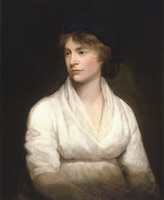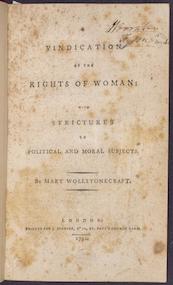 Born in Spitalfields in London on 1759, Mary’s family life was turbulent.
Her early experiences of domestic violence and the unhappy marriage of her sister combined with her frustration with the limited opportunities for women without a significant private income. At the age of 25 she founded
a school for girls in Newington Green, and published her first book Thoughts on the Education of Daughters three years later.
Born in Spitalfields in London on 1759, Mary’s family life was turbulent.
Her early experiences of domestic violence and the unhappy marriage of her sister combined with her frustration with the limited opportunities for women without a significant private income. At the age of 25 she founded
a school for girls in Newington Green, and published her first book Thoughts on the Education of Daughters three years later.
In 1791 Mary moved into a house on Store Street, just a few minutes walk from Senate House. There she wrote her most famous work A Vindication of the Rights of Woman, appealing for a radical revolution in female manners and education as the basis for her feminist ideas.
Her death at the age of 38 on 10 September in 1797, shortly after the birth of the baby who would become the writer Mary Shelley, was a tragic loss, but her writing on the importance of political equality for women and education for girls has resonated in the streets and history of pioneering women in Bloomsbury, particularly in the foundation of the Bedford College for Women at 48 Bedford Square in 1849 by social reformer, anti-slavery activist and philanthropist Elizabeth Jesser Reid, and Emmeline Pankhurst’s foundation of the Women’s Franchise League in her home at 8 Russell Square in 1899.
Mary’s legacy
When we look at the pioneers from the eighteenth century onwards we see that they dreamed of the educational opportunities and political, economic and social agency women have today. Their vision of how the rights they so desperately wanted would change the lives of future generations of women and men is still vivid. The dreaming of feminist campaigners and activists continues – and when we look back at the work of Wollstonecraft it is both shocking and inspiring to see how much we still have to fight for. Our mission, handed to us across the centuries, is to look at systems of oppression, methods of erasure and suppression, and the power and potential of an equal society for women and men. No persuasive arguments have ever been made as to why women should not have the same educational or employment opportunities as men, why people should be treated differently because of their skin colour or place of birth, or why women should not have control over their own bodies in public space and in private life.
As we move forward, there is power in the knowledge that we are not alone, but stand on the strong and courageous shoulders of those that have come before – and the more we know of our shared history the more confident we can feel that the struggle is worthwhile, vital, and capable of success.
Sharing Mary’s words
 The
Rights for Women: London’s Pioneers in their Own Words exhibition at Senate House Library shows the importance of women communicating their ideas in print and finding and working with communities of like-minded
women in spirit as well as in person. Feminist thinker and writer Mary Wollstonecraft, like the other pioneers in the exhibition, recognised the value of her personal and political agency, and by reflecting on her personal
experience of social injustice within her family and working life, shared her vision of the possibility and necessity of change in ways that are still challenging for our society today.
The
Rights for Women: London’s Pioneers in their Own Words exhibition at Senate House Library shows the importance of women communicating their ideas in print and finding and working with communities of like-minded
women in spirit as well as in person. Feminist thinker and writer Mary Wollstonecraft, like the other pioneers in the exhibition, recognised the value of her personal and political agency, and by reflecting on her personal
experience of social injustice within her family and working life, shared her vision of the possibility and necessity of change in ways that are still challenging for our society today.
In this year of celebration of the granting of the Parliamentary vote to some women, we are looking back as well as forward through the ‘waves’ of feminist activism. Campaigners in the nineteenth and twentieth centuries were inspired by the words and ideas of Mary Wollstonecraft, and her passion and legacy continue to inspire campaigners at all levels of society today.
2018 has seen renewed interest in commemorating Mary Wollstonecraft in ways that will influence future generations. In May, sculptor Maggi Hambling was chosen to create a statue celebrating Wollstonecraft in Newington Green by the Mary on the Green project which continues to raise money for the statue, and the theatre company Fragments and Monuments are bringing Mary’s story and words to life in Wollstonecraft Live, a multimedia site-specific performance in September.
Wollstonecraft’s writing has been and continues to be an inspiration to those campaigning for women’s equal rights, representation, and opportunities. You can see a rare first edition of her famous A Vindication of the Rights of Woman in Senate House Library’s Rights for Women: London’s Pioneers in their Own Words exhibition.

